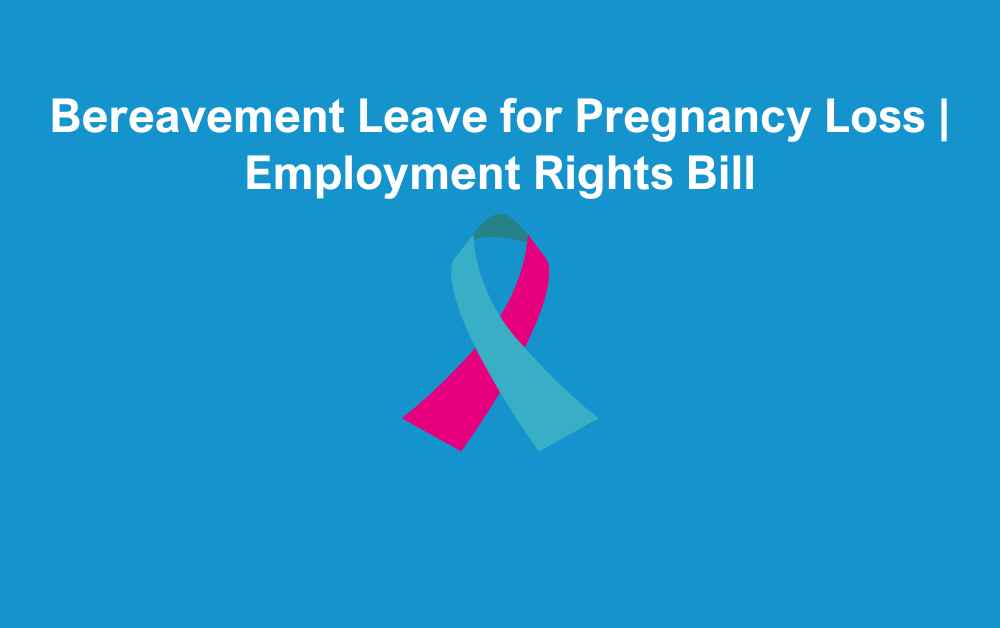As part of the Employment Rights Bill Amendments announced at the beginning of the month, the Government plan to extend Bereavement Leave for pregnancy loss before 24 weeks of pregnancy. If passed, this means that families suffering pregnancy loss will have a right to time off. This is part of the Governments plan to improve workers rights and improve dignity at work.
Deputy Prime Minister Angela Rayner said: “No one who is going through the heartbreak of pregnancy loss should have to go back to work before they are ready,”
This change is an important step in recognising the emotional impact of early pregnancy loss. With no current right to paid leave before 24 weeks, many families are left without time to grieve. The new entitlement would offer vital support and has been welcomed by campaigners and HR professionals as a move towards more compassionate and consistent workplace practices.
What’s the current law on Bereavement Leave?
Currently, there’s no specific law that guarantees an employee the right to bereavement leave. However, under the Employment Rights Act 1996, employees can take time off to deal with emergencies, including the death of a dependent. This time off is not required to be paid by law.
Parents who sadly lose a child under the age of 18, or experience a stillbirth after 24 weeks of pregnancy, may be entitled to two weeks of paid Parental Bereavement Leave.
By extending bereavement leave for pregnancy loss before 24 weeks, this amendment would close a significant gap in support and offer more families the time and space they need to grieve.
Here is a Breakdown of Changes to Expect
The proposed amendments to the Employment Rights Bill aim to expand support for employees dealing with different types of loss. Key changes expected include:
Pregnancy Loss Before 24 Weeks:
Bereavement leave may be extended to employees who experience early pregnancy loss, including:
- Miscarriage
- Ectopic pregnancy
- Molar pregnancy
- Termination for medical reasons
- Unsuccessful IVF due to embryo transfer loss
Bereavement Leave for Other Loved Ones:
A new right may be introduced for employees to take a minimum of one week of unpaid bereavement leave following the loss of a close relative or loved one, beyond immediate dependents.
These changes are part of a wider effort to ensure compassionate, fair treatment for employees facing personal loss.
When will the Bereavement Leave Extension Become Part of Legislation?
According to the Employment Rights Bill Roadmap, changes to Bereavement Leave for pregnancy loss are not expected to come into effect until 2027. While the proposals mark an important step forward, the bill still needs to pass through several stages in Parliament before becoming law. This means it could be some time before employers and employees see any formal changes. However, the discussion around these amendments highlights a growing recognition of the need for more compassionate workplace policies, particularly around pregnancy loss and bereavement.
How We Can Support
While these changes are not yet part of employment law, it’s important for employers to start preparing ahead of time. Taking proactive steps now can help ensure your business is ready to respond with compassion and compliance when the new rules come into effect.
At The HR Booth, we can support you in preparing for the Bereavement Leave extension by offering:
- Management Training
Equip your managers with the knowledge and confidence to handle sensitive conversations around pregnancy loss and bereavement with empathy and professionalism. We provide practical training tailored to your business needs. -
Reviewing and Updating Policies
We’ll help you assess your current bereavement and family-related policies to identify gaps and ensure they reflect best practice — even before legal changes are introduced. This includes aligning your policies with your organisation’s values and employee wellbeing goals. -
Drafting Practical Guidance
We can create clear, compassionate guidance for both managers and employees. This will outline what support is available and how to access it. This can help foster a more supportive workplace culture and reduce uncertainty during difficult times.
Taking action now demonstrates your commitment to supporting staff through personal loss. It will help to build trust and improve employee wellbeing across your organisation.
Conclusion
The proposed extension of Bereavement Leave for pregnancy loss before 24 weeks is a much-needed and long-overdue step towards more compassionate workplace policies. These changes won’t come into effect until 2027 at the earliest. However, they reflect a wider cultural shift in recognising the emotional impact of pregnancy loss and the importance of supporting employees through grief.
By preparing now, employers can lead the way in creating more supportive, understanding, and inclusive workplaces. Putting the right training, policies and guidance in place will not only ensure compliance when the law changes, but also help build a positive, caring workplace culture where employees feel valued and supported during life’s most difficult moments.
Contact Us
If you’d like help preparing for the upcoming changes to Bereavement Leave for pregnancy loss, or want to review your current policies and practices, we’re here to support you.
Get in touch with The HR Booth to discuss how we can help you:
- Train your managers to handle sensitive situations with confidence and compassion
- Update your HR policies in line with best practice
- Draft practical guidance for your teams
Let’s work together to create a more compassionate workplace.







